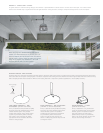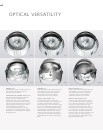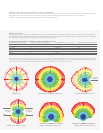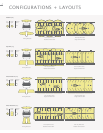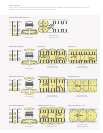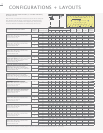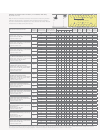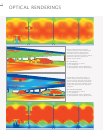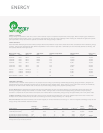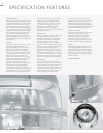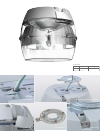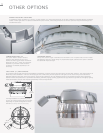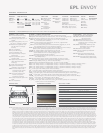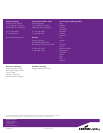
ENERGY
ENERGY SAVINGS
Energy savings is important to end users, and in some instances may be a compliance requirement of the project. When comparing past methods to
present and future technologies, there is no apparent single method to solve all energy challenges while meeting the multitude of application specific
job requirements. Envoy has numerous options to consider when energy savings is desired.
LAMP OPTIONS
Pulse Start Metal Halide/High Pressure Sodium/Compact Fluorescent/Induction-Lamp choice should be the first consideration when addressing energy
concerns. Various lamp technologies offer different capabilities in the amount of light that is achievable per consumed watt [defined as efficacy], and
the expected lifetime of the light source.
CONTROL OPTIONS
Consider Envoy’s available control options to vary output and save energy. By harvesting available daylight along garage perimeters, designers can
strategically place sensor activated luminaires that can be dimmed during daylight hours. Photo sensors, timers and motion sensors [all available by
others] are all viable control methods that can be used to promote energy savings during daytime operating hours.
Hi/Low Dimming [HL]: Available with specific HID lamps and CWA ballast circuits, this option features a PC board within Envoy that allows step
dimming through low voltage wires hooked to a control module, making it ideal to harvest natural daylight along perimeters of open parking
structures. Compared to the same fixture at full power, this method offers an astounding energy savings of approximately 51% in low power mode.
CF Multi-Switching: Compact Fluorescent makes energy savings possible through dimming or by using multiple lamps and circuits. Fixtures with
multiples of two, three and four lamps are able to save energy 33-50% by simply switching 1 or 2 lamps off.
Electronic Ballasts: HID electronic ballasts can be used integrally or remote mounted to save energy 12-15% over magnetic technology and up to 50%
energy savings with dimmable electronic ballasts.
Watts/Lamp Type Bulb Type ANSI Code Nominal Lamp Watts Initial Lumens Life [Hours]
175w MH Clear ED17 M57 175 14,000 10,000
200w MP Clear ED17 M136 200 21,000 12,000
175w MP Clear ED17 M152 175 17,500 15,000
150w MP Clear ED17 M102 150 14,000 15,000
100w MP Clear ED17 M90 100 9,000 15,000
150w HPS Clear ED17 S55 150 16,000 24,000
100w HPS Clear ED17 S54 100 9,500 24,000
70w CF Coated GX24q-6 -- 70 5,200 12,000
57w CF Coated GX24q-5 -- 57 4,300 12,000
42w CF Coated GX24q-4 -- 42 3,200 12,000
85w Induction Coated P41 -- 85 6,000 100,000
NOTE: Values are per [1] lamp. Information varies; consult manufacturer for specific information.
Total
Average Number Yearly Savings
Lamp Source Input Watts of Fixtures
4
Hours
5
Days/Year $/kW-hr
6
Cost [$] Per Year [$]
175W MP [Full Power] 208
1
1250 12 365 .1065 121,282
175W MP [Low Power]
2
101
2
1250 12 365 .1065 58,892 62,390
[4] 42W CF [4 Lamps-Full Power] 186 1250 12 365 .1065 108,454
[4] 42W CF [2 Lamps-Low Power]
3
93 1250 12 365 .1065 54,227 54,227
NOTE: 1 Magnetic ballast CWA circuit. 2 Pulse Start Metal Halide using HL option with Lumark CML Industrial HID dimming system. 3 Compact Fluorescent lamps using 4CF2 option. Lamps are wired on 2 separate
circuits. Control management by others. 4 Fixture quantity and amount of usable daylight may vary in garage application and design. 5 12 hour low power mode used for example, applications may vary.
6 Average national cost per kilo-watt hour, DOE 2007



